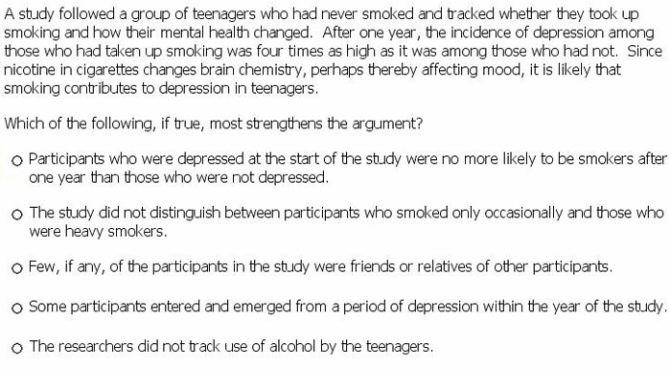Events & Promotions
|
|

GMAT Club Daily Prep
Thank you for using the timer - this advanced tool can estimate your performance and suggest more practice questions. We have subscribed you to Daily Prep Questions via email.
Customized
for You
Track
Your Progress
Practice
Pays
Not interested in getting valuable practice questions and articles delivered to your email? No problem, unsubscribe here.
- Nov 20
07:30 AM PST
-08:30 AM PST
Learn what truly sets the UC Riverside MBA apart and how it helps in your professional growth - Nov 22
11:00 AM IST
-01:00 PM IST
Do RC/MSR passages scare you? e-GMAT is conducting a masterclass to help you learn – Learn effective reading strategies Tackle difficult RC & MSR with confidence Excel in timed test environment - Nov 23
11:00 AM IST
-01:00 PM IST
Attend this free GMAT Algebra Webinar and learn how to master the most challenging Inequalities and Absolute Value problems with ease. - Nov 25
10:00 AM EST
-11:00 AM EST
Prefer video-based learning? The Target Test Prep OnDemand course is a one-of-a-kind video masterclass featuring 400 hours of lecture-style teaching by Scott Woodbury-Stewart, founder of Target Test Prep and one of the most accomplished GMAT instructors.
A
Be sure to select an answer first to save it in the Error Log before revealing the correct answer (OA)!
Difficulty:
 25%
(medium)
25%
(medium)
Question Stats:
78% (01:35) correct 22%
(01:55)
wrong
22%
(01:55)
wrong  based on 4138
sessions
based on 4138
sessions
History
Date
Time
Result
Not Attempted Yet
A study followed a group of teenagers who had never smoked and tracked whether they took up smoking and how their mental health changed. After one year, the incidence of depression among those who had taken up smoking was four times as high as it was among those who had not. Since nicotine in cigarettes changes brain chemistry, perhaps thereby affecting mood, it is likely that smoking contributes to depression in teenagers.
Which of the following, if true, most strengthens the argument?
(A) Participants who were depressed at the start of the study were no more likely to be smokers after one year than those who were not depressed.
(B) The study did not distinguish between participants who smoked only occasionally and those who were heavy smokers.
(C) Few, if any, of the participants in the study were friends or relatives of other participants.
(D) Some participants entered and emerged from a period of depression within the year of the study.
(E) The researchers did not track use of alcohol by the teenagers.
Source : GMATPrep Default Exam Pack

Capture.JPG [ 60.51 KiB | Viewed 70653 times ]
Which of the following, if true, most strengthens the argument?
(A) Participants who were depressed at the start of the study were no more likely to be smokers after one year than those who were not depressed.
(B) The study did not distinguish between participants who smoked only occasionally and those who were heavy smokers.
(C) Few, if any, of the participants in the study were friends or relatives of other participants.
(D) Some participants entered and emerged from a period of depression within the year of the study.
(E) The researchers did not track use of alcohol by the teenagers.
Source : GMATPrep Default Exam Pack
Attachment:
Capture.JPG [ 60.51 KiB | Viewed 70653 times ]
Kudos
Bookmarks
+1 for A.
Its a classic Cause - Effect Strengthener question
According to the argument,
Cause : Smoking ; Effect: Depression
Smoking caused Depression.
A choice that strengthens can aim at proving any of the following
1) "Effect" did not cause "cause".
2) Effect and cause cannot occur independently.
3) There was no alternate cause for the effect.
Choice A strengthens by indicating "Effect" did not cause the "cause", ie depression did not cause people to take up smoking.
Crick
Its a classic Cause - Effect Strengthener question
According to the argument,
Cause : Smoking ; Effect: Depression
Smoking caused Depression.
A choice that strengthens can aim at proving any of the following
1) "Effect" did not cause "cause".
2) Effect and cause cannot occur independently.
3) There was no alternate cause for the effect.
Choice A strengthens by indicating "Effect" did not cause the "cause", ie depression did not cause people to take up smoking.
Crick
tuanquang269
Posts: 375
Kudos
Bookmarks
a) Participants who were depressed at the start of the study were no more likely to be smokers after one year than those who were not depressed.
This answer says that depression does not make the teenagers smoke. Defend the reverse cause-effect relationship. So, this is the correct answer.
Do you have any question? About your choice or confusion? Let's me know
Hope that helps.
This answer says that depression does not make the teenagers smoke. Defend the reverse cause-effect relationship. So, this is the correct answer.
Do you have any question? About your choice or confusion? Let's me know
Hope that helps.











